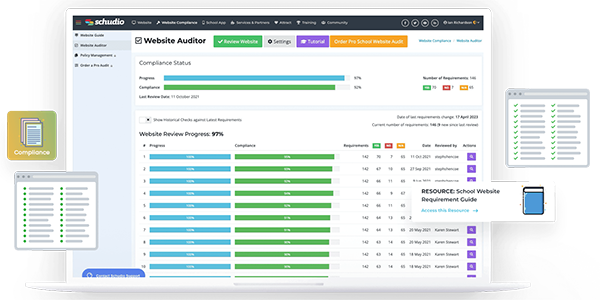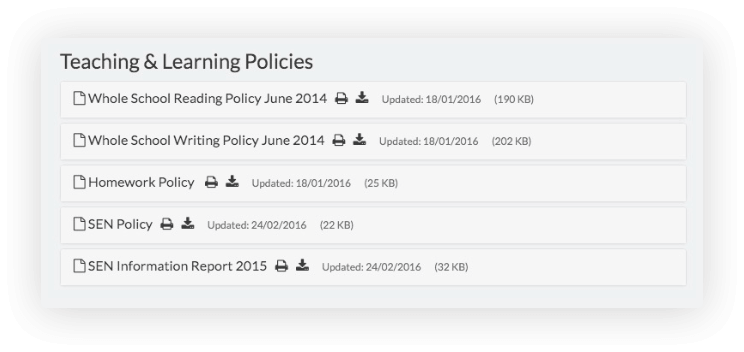What’s New for 2025?

Having a school website compliance checklist is crucial for schools to meet statutory requirements and prepare for Ofsted inspections.
Throughout this guide, we will explore the details of what Maintained Schools, Academies, Free Schools & Trusts must publish online and the most important actions you need to take to make your website compliant.
What’s more, you’ll find a full, current, and comprehensive checklist to audit your website alongside best practice advice and examples of schools that are excelling at compliance.
Latest School Website Requirements
Last updated for October 24, 2024
The very latest strategies for highly effective school website compliance are focused on how you effectively use your website to get ahead of an inspection by evidencing how you do what you say you do.
BUT, the single most important thing to remember is that if you wait until you’re approaching an inspection, this work will be much harder.
Are you demonstrating the quality of education in your school through your school website?
That is now what the very best schools are doing and it isn’t as hard as you might think. Think about what you say you do in a particular area of school life. Then listen to parents, students and teachers to get their opinion. Then provide evidence on your school website of this in action. Repeat this process for everything you do. As a result they don’t worry about inspections.
* Note the way we deal with ‘must’ and ‘should’ requirements, if a requirement says should or must we’re recommending you add the content to your website. All the ‘should’ requirements are included in the guide.
* Our checklist explains what content to display on your website and offers suggestions on how to implement them to ensure you meet and exceed the current requirements.
* The checklist has been designed to be simple to follow and allow for a consistent approach as you audit your own website. Mark off a requirement status however you want, and assign an individual to be in charge of resolving a section of requirements.
* If you are struggling for time, ask one of our experts to carry out a Pro School Website Audit for you and we’ll provide a fully actionable report on your website and support you in making your site compliant as quickly as possible.
7 Top Tips for School Website Compliance
Our in-house experts have access to DfE contacts, Multi Academy Trust Directors and hundreds of schools using the School Website Requirements Software. The hard truth? Inspectors are looking for much more than just a completed checklist.
So, before we get to the detailed checklist that outlines and explains all the required content for your school or college website here’s our top 5 tips to take your website beyond the statutory requirements for 2024.
Presenting Policies & Documents

Displaying policies and documents on your school website may not be the most exciting content to display, but it’s really important to get it right consistently. Statutory content doesn’t generally need to be updated as frequently as other areas on your website, such as news or your blog. But, it does have to stand the test of time. Visitors will be looking at the same policy page until your website gets re-designed (probably about 3 years) so making sure this page looks and functions correctly is important.
An important note – make sure you include any relevant legislation in the introduction to each of your policies where you are instructed to reference it. You’d be amazed how often this is missing!
Displaying Policies
Group your policies into categories and display them on your page, rather than one long list of documents for a visitor to scan through. Add some sort of styling to the page, even something as simple as an icon next to the file-name will break up the content and make it easier to use.
Also, think about the functionality you offer visitors. It’s quite nice to include specific links for downloading and printing policies, and if you can include an in-page preview of the document that’s a brilliant approach. This has the benefit of not taking your visitors away from the page, rather offering readily accessible content directly within the page (Ofsted says this is compulsory with some content).

Policies displayed with Schudio School Website Software Document Groups Module
The Schudio Solution
We offer a whole unique and powerful module for managing documents called Document Groups. Upload a file, provide details of the name and add it to the page. Create as many groups of documents as you need, drop them anywhere on your website. You can even drop them in multiple locations and when you update, for example your SEND policy, it will update in every location on your website.
For Multi-Academy Trusts, this can be used across all websites, no matter who your provider is for each school so that you can effectively manage your policy content from one place for all your websites.
The School Website Checklist 2025
Last updated October 24, 2024
Ofsted school website requirements change often. This School Website Checklist is always up to date.
The sections below contain all the latest requirements so you’ll have everything that is expected of your school website fully covered before Ofsted arrive. If you need any help or advice, as you work your way through this school website checklist, let us know.
You can schedule a free call anytime!
Table of Contents
The admission arrangements section is different depending on your school type and who determines your admissions. Every maintained school and academy trust must publish their admission arrangements to comply with the:
Foundation and voluntary aided schools have specific responsibilities regarding the information they must publish, especially concerning admission arrangements and performance measures. They must also follow updates in various sections of guidance, including governance and diversity, to ensure transparency and compliance with regulations.
The school admissions and appeals codes do not apply to special academies, alternative provision settings or stand-alone 16 to 19 institutions.
Additional information is available in the government guidance for school leaders and staff on developing and publishing your school’s behaviour policy.
This information has been simplified to be more clear and easy to understand. The information below has been collated from the requirements published by DfE and restructured to be easier to understand and implement.
Guidance on charging for school activities is available. Sections 449 to 462 of the Education Act 1996 set out the law on charging in schools maintained by local authorities. Academies are required by their funding agreement to comply.
All schools and colleges should publish details about their complaints policies and procedures.
Read guidance on developing your school’s complaints procedure.
NOTE: Schools that do not have a website
Schools that do not have their own website must publish this information on an alternative website and provide parents and carers with a link to it.
EXPLAINED: You must still publish all of the information which is set out on this webpage online even if you do not maintain your own website. You can use an alternative website to host the information as long as you make the address and details of the website known to parents, for example, by providing parents with the URL (website address) and any other relevant details.
This requirement is for information about the curriculum being taught at your school to be presented on your website. Some requirements are education phase specific. The information below has been collated from the requirements published by DfE to avoid duplication and make the information easier to understand.
Make sure you cover all the requirements appropriate for the phases taught at your school. Consider backing up your curriculum information up with regular blog posts demonstrating work.
NOTE for all schools: Your approach to the curriculum should also include how you are complying with your duties in theEquality Act 2010 and the Special Educational Needs and Disability Regulations 2014 about making the curriculum accessible for those with disabilities or special educational needs.
These requirements are specific to academy trusts and FE colleges. There is no requirement for academies to publish information related to the trust, nor is there a requirement for maintained schools to publish this information.
These requirements are specific to maintained schools. Note that this requirement includes the previously separate requirement for linking to the benchmarking service.
Schools must publish on their website up-to-date details of its governance arrangements in a readily accessible form. The details below have been broken down by school type.
Maintained Schools publish information on the governing body in line with the constitution of governing bodies of maintained schools statutory guidance.
Academies can follow details as explained in the ‘Academies financial handbook’ (paragraphs 2.49 to 2.50).
All schools are required to do one of the following. See the Schudio Tip below for best practice advice.
This is an entirely new requirement with different requirements for all organisations. Note how the advice is to publish this information no matter what size organisation you are. We have collated the requirements to make this easier to understand and implement.
Previously titled, Equality Objectives – Public bodies, must comply with the public sector equality duty in the Equality Act 2010 and the Equality Act 2010 (Specific Duties and Public Authorities) Regulations 2017. The Equality Act 2010 and Advice for Schools provide information as to how your school can demonstrate compliance.
This requirement was new in 2022 and is still missed by lots of schools. Schools should publish on their website their opening and closing times and the total time this amounts to in a typical week (for example 32.5 hours).
Schools should show the compulsory times they are open. This time runs from the official start of the school day (morning registration) to the official end of the compulsory school day. It includes breaks, but not optional before or after school activities.
This requirement was new in 2022 and is still missed by lots of schools. The department produces statutory guidance on the cost of school uniforms which schools must have regard to when developing and implementing their school uniform policy. This guidance requires schools to publish their uniform policy on their website.
You must publish a report on your school’s policy for pupils with SEN and update it annually. You should update any changes occurring during the year as soon as possible. You should update any changes occurring during the year as soon as possible. The report must comply with section 69 of the Children and Families Act 2014.
We have combined the requirements below and worked on the basis that where some requirements for academies are marked as ‘should’ by DfE, we have marked these as ‘must’ for ease of understanding and implementation. So, all requirements below should be understood to be mandatory for all schools, where the key stage is applicable.
This list of requirements is NOT published on the main requirements pages currently but as of September 2019 the guidelines around Keeping Children Safe in Education makes specific mention of the requirement to publish safeguarding information on the school website.
In an inspection, the lead inspector will prepare for the inspection by gaining an overview of the school’s recent performance, and any changes since the last inspection. There is also a requirement around making some of your safeguarding information available publicly, with your website being the specific medium mentioned to do this.






